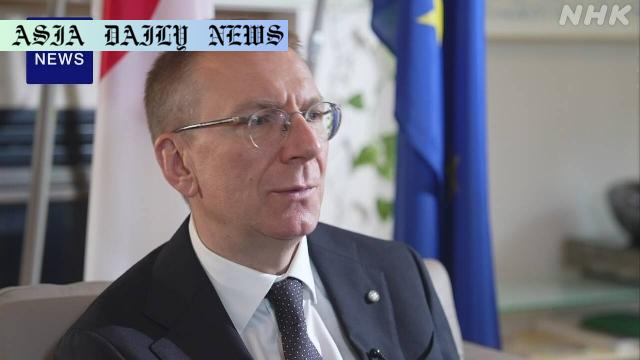Sanctions: Latvia urges intensified economic pressure on Russia.

The Context Behind Latvia’s Call for Action
Latvian President Edgars Rinkevics has called for the international community to impose more severe political and economic sanctions on Russia. His statement comes as Ukraine and Russia engage in direct talks for the first time in three years, amidst an unrelenting conflict. Rinkevics conveyed his remarks during a visit to Japan for the World Expo in Osaka, showcasing his nation’s active role in addressing global issues despite its modest size on the world stage.
Highlighting Russia’s lack of genuine commitment to ceasefire negotiations, he pointed out that continued pressure is crucial for compelling the Kremlin to take diplomatic efforts seriously. The president emphasized that Russia has shown no substantial effort toward an unconditional ceasefire, which is essential for any progress to be made in resolving the ongoing crisis prolonging human suffering in Ukraine.
The Role of Sanctions in Leveraging Peace
Economic and political sanctions have long been tools used to isolate and penalize nations that violate international norms. Latvia, being one of Russia’s immediate neighbors, has felt the ripple effects of the conflict in Ukraine, whether in terms of security concerns or economic instability in the region. Rinkevics believes that amplifying these measures would put heightened financial stress on Russia and demonstrate broader international solidarity against its actions.
The recent talks between Russia and Ukraine offered a glimmer of hope, but the Latvian President’s skepticism reflects the deep-seated distrust that has accumulated over years of unresolved tensions. Rinkevics highlighted that sanctions alone may not resolve the conflict but are vital in setting the stage for meaningful negotiations. The reinforcement of sanctions, he argues, is an indispensable strategy to both pressurize and incentivize reluctant actors to engage genuinely in peace efforts.
The International Community’s Next Moves
Looking beyond sanctions, Rinkevics underscored the importance of global collaboration and dialogue. He touched upon the significance of the upcoming phone talks between US President Donald Trump and Russia’s Vladimir Putin. The Latvian leader expressed a measured optimism, hoping for some constructive outcomes from this interaction. However, he remained realistic, noting that much depends on the effective execution of diplomatic efforts in holding Russia accountable.
Furthermore, Rinkevics called on European and global leaders to align their economic policies and defense strategies to confront Russia’s actions effectively. He reiterated that a stable and peaceful Ukraine is not just vital for Eastern Europe but crucial for global security and economic stability.
Latvia’s Role in Global Diplomacy
As a Baltic state sharing borders with Russia, Latvia has consistently voiced its concerns over Moscow’s aggressive policies. Since gaining independence from the Soviet Union, the nation has actively participated in NATO and the European Union, advocating for policies that safeguard regional stability. Latvia’s current stance reflects its enduring commitment to international law, security, and democracy, emphasizing that global issues demand collective responsibility.
While Latvia may not carry the economic heft of larger nations, its determined leadership in rallying support for Ukraine and standing firm against Russian aggression showcases its courage and moral clarity. The call for increased sanctions also sends a powerful message on behalf of smaller nations that are disproportionately vulnerable to the fallout of such conflicts.
Hope Amidst Challenges
The ongoing crisis between Russia and Ukraine serves as a stark reminder of the importance of unity and resilience. While the path to peace remains uncertain, President Rinkevics’ call for action reflects Latvia’s unwavering resolve to be part of the solution. His remarks underline the importance of keeping international attention focused on the issue and ensuring that efforts to uphold peace and justice do not falter amidst competing global challenges.
Commentary
Latvia’s Admirable Stance on Global Diplomacy
The recent remarks by Latvian President Edgars Rinkevics serve as a shining example of how even smaller nations can exert bold leadership in addressing global crises. His call for tougher sanctions on Russia highlights Latvia’s commitment to the principles of sovereignty, peace, and democracy—values that underpin the international order. It is especially noteworthy how Latvia, as a neighbor to Russia, continues to display both moral and pragmatic leadership during such critical times.
For decades, small nations have often been perceived as passive players in international affairs. Latvia, however, defies this stereotype by demonstrating how proactive diplomacy, strategic alliances, and firm principles can amplify a voice within the global community. The president’s suggestion of intensifying sanctions is not merely punitive but a tactical approach aimed at pushing Russia toward genuine negotiation. With its unique position in Europe, Latvia speaks from direct experience, making its calls for action all the more compelling.
The Power and Limitations of Sanctions
That said, sanctions have their limitations, and this must be acknowledged. While they can exert economic stress and isolate a nation diplomatically, they are often a double-edged sword, with repercussions felt globally. The interconnectedness of today’s economies means that sanctions on a powerful state like Russia could generate significant economic ripple effects, particularly for neighboring nations such as Latvia.
Nevertheless, Rinkevics’ appeal to the international community reflects a keen understanding of the broader stakes involved. The ongoing crisis in Ukraine is a test of global resilience against aggression and the undermining of sovereignty. By urging measures to hold Russia accountable, Latvia is essentially advocating for stronger safeguards that ensure smaller nations can coexist safely within a rules-based international system.
A Hopeful Benchmark for Diplomacy
While the journey to peace remains fraught with difficulties, Latvia’s leadership offers a hopeful benchmark for diplomatic resolve. It serves as a reminder that leadership is not confined to the size or power of a nation but stems from its commitment to stand up for what is right. If nations—both small and large—can unite on this issue, the possibility of meaningful progress in resolving the Russia-Ukraine conflict becomes more tangible.


